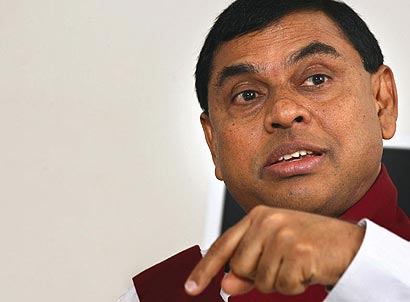Minister Basil Rajapaksa tells The Hindu: INDO LANKA ACCORD NEVER FOR POLICE POWER SHARING

Casting fresh light on the Indo-Lanka Accord of 1987 which gave birth to the 13th Amendment to Sri Lanka’s Constitution, Economic Development Minister Basil Rajapaksa told The Hindu newspaper in India that devolving Police powers would actually amount to going against the Accord. He pointed to section 2.10 of the Accord which calls for the government to use the “same organisations and mechanisms” for law enforcement and security in the Northern and Eastern Provinces as in the rest of the country, saying this meant that there could not be more than one police force for the whole country.
“It is very clear in the Accord. It says Police powers have to be with one Police, there is no separate mechanism. So you can’t have a separate police force in the provinces,” Rajapaksa told The Hindu newspaper in an interview.
He said Sri Lanka would never risk a provincial government forming its own “army” through devolved police powers. Referring to the Tamil National Army – a militant outfit raised by the
beleaguered 1988 EPRLF government in the North-Eastern Province in a futile attempt to protect itself against the LTTE that had rejected the Amendment and boycotted the election – he said there was no ruling out that a future Northern provincial government would not do the same: “If [the NPC] forms another army, can we afford another war now?”
He dismissed arguments that armed struggle by the Tamils was now a thing of the past, and that the 13th Amendment in any case gave the President overriding powers over the province.
As Sri Lanka moves to hold elections for the first time in the Northern Province, there is a debate in the country over the pros and cons of the 13th Amendment, including the proposed changes by the government to strip it of clauses that it perceives to be inimical to national and territorial integrity; and the reported insistence by India on its full implementation.
Both Minister Rajapakasa’s trip to New Delhi, and quickly after, India’s National Security Adviser (NSA) Shiv Shankar Menon’s visit to Colombo, seem to have focused on this issue; for weeks, the Sri Lankan media has been debating it threadbare.
Minister Rajapaksa questioned the TNA’s choice, describing the TNA’s chief ministerial candidate C. V. Wigneswaran as a candidate of “external forces” who did not represent the people of the North. The minister was already certain that a TNA government in the North would be on collision course with the Centre.
The government, he said, had given the Tamil people, “everything” – roads, railways, water, electricity, schools and hospitals. The minister said a TNA provincial government would whip up other “emotional issues” that neither it nor the government would be able to deliver.
The government recently set up a Parliamentary Select Committee to revisit the 13th Amendment. Mr. Rajapaksa defended the move, saying no constitutional provision was permanent, and all over the world, it was the practice to make changes in the statute.
He declined to say if the changes would come before or after the election, calling it an ongoing process. Sometimes, he said, such processes took years.
The committee has been boycotted by the TNA and the UNP. Moreover, dissenters on the issue within the ruling coalition, such as the Sri Lanka Muslim Congress, are not included in the Committee.
Minister Rajapaksa sought to explain questions about the credibility of the incomplete panel by saying it would solicit wider opinion by inviting public testimonies. Asked if India – Sri Lanka relations had been affected as a result, he said both countries “understand each other’s point of view. It is Sri Lanka’s problem, and Sri Lanka must find a solution from Sri Lanka itself”.
India’s vote against Colombo two years in a row at the Human Rights Council (HRC) in Geneva, he said, had “very badly hurt our relationship” but Sri Lanka had “managed it very well”, understanding that it was due to “internal pressure”.
Nor had Sri Lanka reacted adversely when Sri Lankan pilgrims and Buddhist monks were attacked in Tamil Nadu.
“So as two sovereign countries and countries who have been friends for a long time we have to understand each other. Our people have been very understanding of India. India must understand that.”
“India’s Sri Lanka-playing -the China card theory was hardly reasonable,” he said, pointing to a recently formed Indian CEO’s forum in Colombo, and the absence of a similar platform for Chinese businessmen in Sri Lanka.
Rather, said the Minister, it was India that was “playing for America”. As evidence, he pulled out a 2011 visit to Chennai by then U.S Secretary of State Hillary Clinton as linked to the Tamil question in Sri Lanka.
A peaceful environment in Sri Lanka was good for India and the people of India, not just for the governments but also for the business community, including those from Tamil Nadu, Rajapaksa said.
(Courtesy: The Hindu)
Latest Headlines in Sri Lanka
- Tension erupts in Moratuwa after cooperative election celebration turns chaotic February 2, 2025
- India allocates INR 3 billion in aid to Sri Lanka in 2025 Budget February 2, 2025
- Skyrocketing prices make cars unaffordable in Sri Lanka despite lifting vehicle import ban February 1, 2025
- Two dead, 35 injured in Habarana bus-van collision February 1, 2025
- Four injured as Presidential Secretariat defender crashes in Thalawa February 1, 2025



Frank and straight forward. Thank you Basil!!!